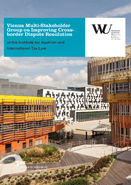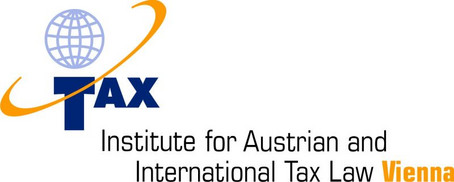Vienna Multi-Stakeholder Group on Improving Cross-border Dispute Resolution
The project on cross-border VAT/GST disputes prevention and resolution, which is conducted by the Vienna Multi-Stakeholder Group on VAT and Disputes, originated as a response to an issue of VAT/GST disputes arising in international trade. Evidence obtained through online questionnaires has demonstrated that this aspect of tax disputes, often overlooked, is more extensive than previously considered by tax policy makers and academics. With diverse VAT/GST designs in tax systems worldwide and increasing globalization and internationalization facilitated by digital technologies, the likelihood of encountering cross-border VAT/GST disputes is rising. Compliance and administrative burdens, tax uncertainties related to unresolved cross-border VAT/GST disputes, and potential impacts on business decisions in international trade and investment emphasize the need to develop solutions to minimize and efficiently resolve such disputes.
The Project's goal is to identify the root causes of cross-border VAT/GST disputes and develop a palette of tools and mechanisms for their prevention and resolution, which can be used by tax policy makers and dispute resolution experts. This initiative has established a forum for discussion, involving representatives from tax administrations of EU and non-EU countries, businesses, business groups, academics, international organizations (e.g., the OECD and IOTA), tax lawyers, consultants, dispute resolution bodies and other cross-border VAT/GST experts worldwide. Currently, the project focuses on improving or adapting existing dispute prevention and resolution mechanisms for cross-border VAT/GST disputes and developing innovative mechanisms for addressing this complex issue.
A New Framework to Guarantee Tax Certainty

The last two decades have seen an unprecedented integration of national economies, the emergence of new players and the growth of global corporations. It has become increasingly challenging to operate national tax systems in a borderless world. At the same time, tax competition has intensified, with countries using their tax systems to attract increasingly mobile economic activities. This has led to an intense debate on whether multinational enterprises are paying their fair share of tax spawning the BEPS project which aims to bolster the international tax framework to protect the tax base of countries and to close existing loopholes. While these measures will have a positive impact on the tax revenues of the countries involved, taxpayers will be facing increased uncertainty and lack of predictability. Countries are likely to have different views on how to apply these measures, leading to divergences and thus an increase in cross-border tax disputes. Yet, so far, little has fundamentally changed in the framework governing the resolution of international tax disputes. The mutual agreement procedure (MAP) found in tax treaties is still the primary mechanism used to resolve such disputes. Despite some improvements in the MAP, the process remains slow and the number of unresolved cases continues to grow.
The international community is at a crucial stage in the debate on how to resolve cross border disputes, with the EU, OECD and UN all putting forward new approaches to achieve more principled and faster outcomes which would go some way towards aligning dispute resolution procedures in the tax area with best practices in other areas such as trade and investment. The G20 has recognised the importance of finding solutions that work both for government and business and the need to avoid adding tax uncertainty to a global environment which is characterised by increasing political and economic uncertainty. This will require a constructive dialogue between tax administrations and business as well as a real engagement of all relevant countries.
The stakes are high: governments need revenues but at the same time most governments recognise that a tax environment in which cross-border disputes remain unresolved will make it hard to attract FDI, which is particularly important for developing and emerging economies. As we move through the transitional period of BEPS implementation-which could take a decade or more-the potential for cross-border tax disputes will increase and therefore there will be more pressure on existing disputes mechanisms, especially MAP.
In this context, the WU Global Tax Policy Center (WU GTPC) has launched a project which conceptualises a comprehensive legal framework to rethink the way cross-border tax disputes are resolved. The project brings together contributions from leading academics, private-sector experts, practitioners, and policymakers from organisations such as the OECD, UN, World Bank, CATA, Commission on Taxation of the International Chamber of Commerce, and European Commission to generate new approaches to tax dispute resolution through high-quality, cutting-edge research that addresses the conceptual and practical concerns of non-OECD countries and fosters an environment based on trust and cooperation.
A neglect issue in the area of disputes relates to disputes which arise in the area of VAT/GST. With the spread of these taxes, more than 160 countries now have them, an increasing number of companies are encountering cross-border disputes especially in regards to characterisation of goods and service, lace of supply and consumption and VAT refunds. Unlike direct taxes there are no well established mechanisms to resolve these issues. WU GTPC has created a small multistakeholder group to establish why VAT disputes arise, how they are resolved in practice and what new dispute minimization and resolution mechanism can be put in place. More information on this sub-group is available here.
Please find attached our latest brochure

![[Translate to English:] Ansicht Campus WU](/fileadmin/wu/_processed_/4/a/csm_112_campus_wu_laptop_960x310_d0ecfae120.jpg)
